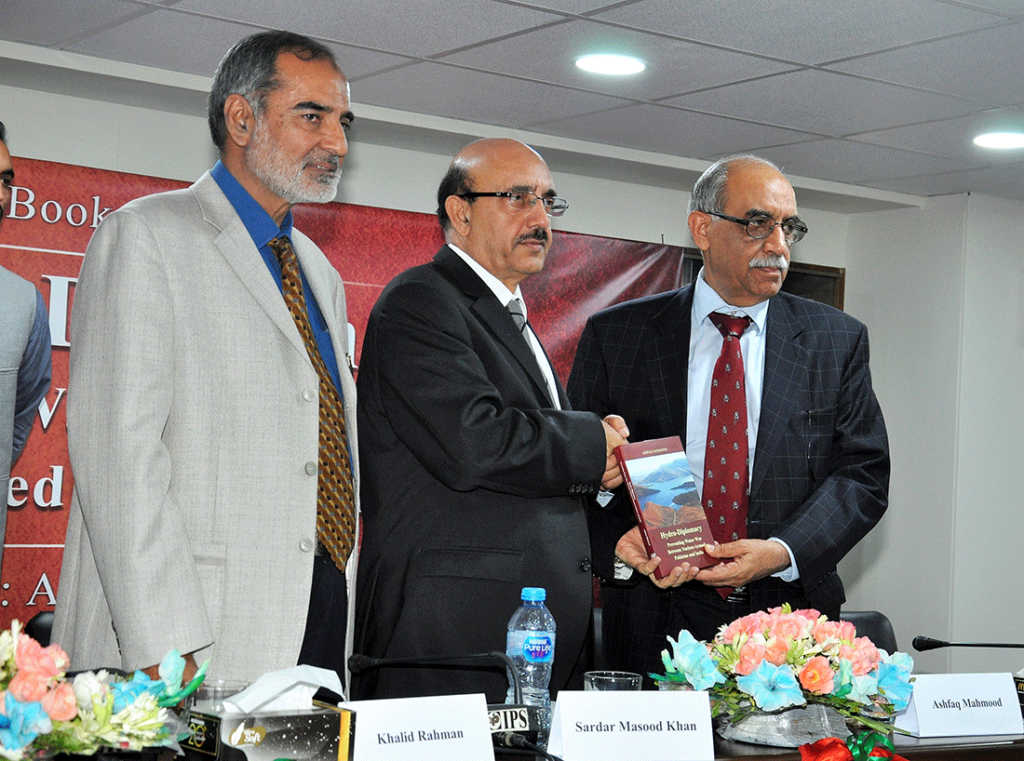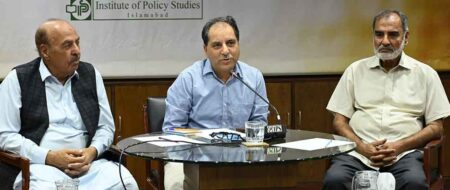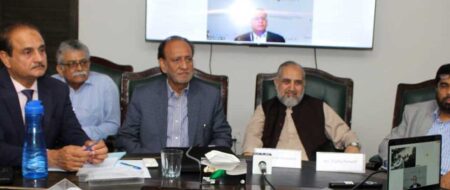Book Launch of ‘Hydro-Diplomacy: Preventing Water War Between Nuclear-Armed Pakistan and India’
Increase in Indian violations of IWT: Experts stress hydro-diplomacy to prevent Pak-India water war
Urging Pakistan and India to solve water issues through hydro-diplomacy and in accordance with Indus Water Treaty, former diplomats and water experts enunciated the fears of war between the two countries if the matters pertaining to water sharing of the mutual rivers were not resolved placidly.
They were speaking at the book launch ceremony of the book Hydro-Diplomacy: Preventing Water War Between Nuclear-Armed Pakistan and India authored by Ashfaq Mahmood, former federal secretary, Water and Power, and published by IPS Press – the publishing arm of the Institute of Policy Studies (IPS), Islamabad – on 22 October 2018.

The ceremony was addressed by Sardar Masood Khan, president, Azad Jammu and Kashmir, as chief guest whereas other speakers of the session included Ambassador (r) Shafqat Kakakhel, Mirza Hamid Hasan, former secretary, Water and Power and the chairman of IPS’ steering committee on Water, Energy & Climate Change, DG-IPS Khalid Rahman and the author Ashfaq Mahmood,.
President Sardar Masood Khan praised the author’s solution-oriented approach, stating that the book was backed by the author’s rich experience, exposure and his mastery in the discipline.
Speaking of the gravity of the water conflict between the nuclear armed neighbours, the AJK president said that the Indian violations were hurting Pakistan in terms of water quality, water depletion, food security and climate change, and the scale of this damage could be envisaged through the fact that per capita water in the country had dropped from 2172cm to 1306cm between 1990 and 2015, an estimate that is authenticated by international bodies such as World Resource Institute and UNDP.
Highlighting the importance of commitment, knowledge-based approach, third-party mediation and strengthening of institutions that was needed for the issue’s resolve, Khan stressed that Pakistan should be smart enough to know Indian tactics of delay – such as presenting Pakistan-India tensions as a smokescreen to complete its hydro-projects, which included Baglihar, Wullar Barrage, Kishanganga dams – at a faster pace.
He also underscored the need for preparing a comprehensive water policy having an external domains encompassing India and other neighbors, as well as internal domain stressing on water conservation, building of dams, investment in environment and the strategies to deal with the challenges of climate change.
Mahmood, while shedding light on the need and significance of the book in the contemporary context, said that there was a very big gap in peoples’ perceptions on Indo-Pak water issues, which was based on hearsay, and what actually happens in the official meetings over the matter. His purpose behind writing the book was to inform the masses about the nature and various facets of this highly critical issue that take place behind the curtains of diplomacy and seldom comes to the knowledge of the common men.
Elaborating the recent controversies regarding Pakistan’s concerns over Indian run of the river projects, the author said that as per the Indus Water Treaty, India was not supposed to interface, control or affect the flow of water towards Pakistan. There have however been violations in nearly all the relevant Indian dam designs which were set to have severe repercussion on Pakistan waters, food and climate.
The speaker said that even the information about the dam designs were conveyed belatedly and inadequately to Pakistan, which was followed by wasting of more time in correspondence. When eventually Pakistan objects to the violations, the statements were started being made from the Indian side igniting sentiments, hiding facts and trying to maneuver the situation in their favor. By enlightening the public, academia, intelligentsia, civil society and other stakeholders over the matter, the author hoped that solid and effective steps would be taken by the authorities to carefully and proactively move towards the resolution of this sensitive issue which can otherwise lead to disastrous consequences not only for India and Pakistan, but for the whole region.
Kakakhel congratulated the author as well as IPS Press for coming up with an excellent book written on a such a crucial topic. He highlighted important points raised by the author in the book such as the cascade of projects launched by the Indian side on the river Chenab and Jhelum, the deteriorating quality of water flowing into Pakistan due to these projects, the alarming reduction of quantity of water flowing into Pakistan, and other important water management issues that were being by faced by Pakistan due to Indian non-compliance with the Indus Water Treaty. He stressed the need to retain rational heads in the situation, albeit not take the threats from the Indian leadership – especially Narendra Modi and his cabinet – lightly, while urging to work towards countering negative tactics from the Indian side.
Hasan hailed the timely publishing of the book and said that the issue that this book dealt with has already reached alarming levels. He mentioned that Indus Water Treaty was signed in an environment where Pakistan needed to ensure Food security, but with the passage of time, the shortcomings of the treaty regarding emerging issues such as environment, increase of population and non-resolution of Kashmir dispute, have become quite evident. He praised the flurry of issues covered by the author in the book including equitable water distribution, ingredients of Water-war, Post Indus Water Treaty issues etc. He concluded stating the best way forward to resolve the issue was to ensure that the Indus Water Treaty was kept alive but reviewed and made more effective in addressing the current issues by including addendums to it.
About the Book
The book describes the ups and downs being faced in managing the transboundary water relations between Pakistan and India since the independence of the two countries in 1947. Despite the Indus Waters Treaty (IWT) signed in 1960, differences between both the countries started re-emerging in 1970s over interpretation of various clauses of the Treaty and the design of infrastructure projects by India on the rivers allocated to Pakistan. Initially these differences were sorted out through hectic bilateral diplomacy. Subsequently, starting mid-eighties, bilateral efforts began to fail resulting in recourse to dispute resolution mechanism envisaged in the Treaty involving the appointment of a Neutral Expert and a Court of Arbitration. This trend is continuing and a number of other project issues are on the same trail but now the two counties are in dispute even over the matter of selection of the appropriate forum for dispute resolution. Besides, a number of issues, which were either inadequately dealt with in the Treaty or were not anticipated at all, such as effects of climate change and ground water depletion, have also surfaced compounding the water issues between the two nuclear-armed neighbours. Temptation to use water as a weapon of political maneuvering is assuming alarming proportions. In 2016, the Indian Prime Minister threatened to choke the flow of water to Pakistan and went to the extent of saying, “blood and water cannot flow together”, while a section of society in Pakistan have not ruled out the possibility of a nuclear war in case the Indian threat is realized.
The book is based on a practitioner’s approach. It describes each recent issue of importance, how it arose, how efforts were made to resolve, why in certain cases bilateral efforts failed and how the cases were contested before third party fora of the Neutral Expert and the Court of Arbitration. Building on this insight and lessons learnt from these real-life experiences, the book suggests how to prevent water issues from escalation in future and hence the war.
About the Author
Ashfaq Mahmood, as federal secretary for Water and Power, Government of Pakistan, was responsible for addressing international trans-boundary waters issues, interprovincial water sharing, overseeing relevant institutions including Pakistan Commission for Indus Waters (PCIW), Indus River System Authority (IRSA) and Water and Power Development Authority of Pakistan. He had also been the Co-Chair of the Trilateral Dialogue between Pakistan, Afghanistan and US on Water Shed Management and Irrigation Technologies, Advisor to IUCN on Transboundary Issues and Hydro-diplomacy. He is a member of a number of Think Tanks.
During 2004-07 he led Pakistan’s team for talks with India on several water issues and for proceedings before the Neutral Expert for settling the dispute between the two countries in relation with the Baglihar Hydro Electric Plant. He was also involved in the preparation of the case on the issue of Kishanganga Hydroelectric Plant which was subsequently adjudicated by the Court of Arbitration (CoA).












